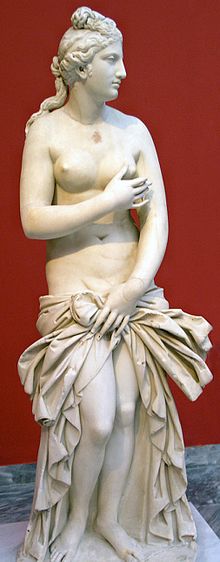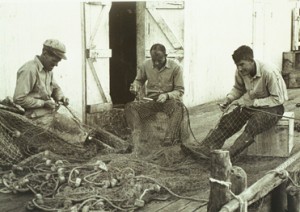Good evening young people and thank you for inviting me to speak on such a relevant subject as the one we will be discussing this evening.
The city of Corinth in which Paul spent at least 18 months establishing their Ecclesia is one of the most significant records we have of early Christian life. If fact we are told more about this Ecclesia and its cultural background than any other ecclesia in the Bible?
Why is that I ask? Why Corinth? And its not until we look deeply into their society and see the influence of Greek and Roman culture with all its trappings, that we begin to understand why God revealed to us such intricate detail concerning their challenges and way of life. The first letter is just short in length to the book of Romans but when you add the two letters together with the detail in the book of the Acts of the apostles, clearly it’s the largest record of any ecclesia in Asia Minor.
I believe the Corinthian culture and the circumstances surrounding this ecclesia were very unique, in fact, extremely unique, so much so, their problems were not like other Ecclesial challenges relevant to their time.
(Forum members: I hope in this study to explore both Corinth and the Ecclesia at Corinth.. I would value any contribution along the way. )
With your patience we will look briefly at Corinth, its history and then move into some of their challenges – which have become our challenges some 2000 years later.
Wealth, Entertainment & Immorality
1. Location & Business
2. Isthmian Games
3. Religion/Immorality
We will look at Corinth's commercial advantage and how this contributed to its unique culture. We will look briefly at its strong sporting history and finally consider together an immoral society where promiscuous practices were woven into the very fabric of false religious worship and how this so terribly affected the Corinthian Ecclesia and its members.
I only ask that you take this time evening to consider “your life” here in 2013, set against what which was Corinth AD50; consider your Ecclesia and the family you belong too and the pressures this society today is having on our sincere praise and worship of God and the Lord Jesus Christ. Nothing is as it seems and what is seen is not real and lasting and that which is coming cannot be seen today but is real and will be seen soon.
1 Corinthians 2:7 we speak the wisdom of God, hidden in a mystery, that God determined before the ages for our glory. 2:8 None of the rulers of this age understood it. If they had known it, they would not have crucified the Lord of glory. 2:9 But just as it is written, “Things that no eye has seen, or ear heard, or mind imagined, are the things God has prepared for those who love him.” 2:10 God has revealed these to us by the Spirit. For the Spirit searches all things, even the deep things of God.
My hope for all of you is the Word of God find a place to rest in each of you and with it you search even the deep things of God for without His Spirit Word you will find Corinth's wealth, sporting greats and a life of sexual immorality which all leads to death.
So lets go searching shall we?
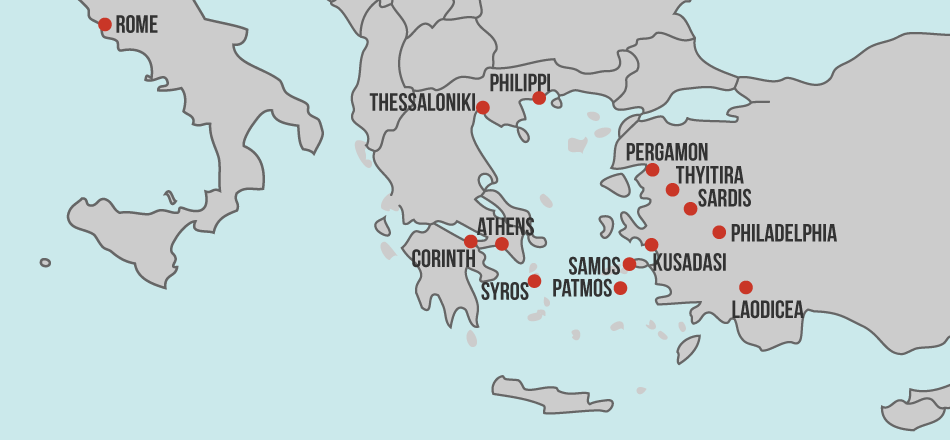
Corinth was the centre of commerce and the centre of Sport in the then known world. It was known as the go to place for sexual immorality in all Rome.
You will notice in the below map how Corinth was in the centre of the then known world.
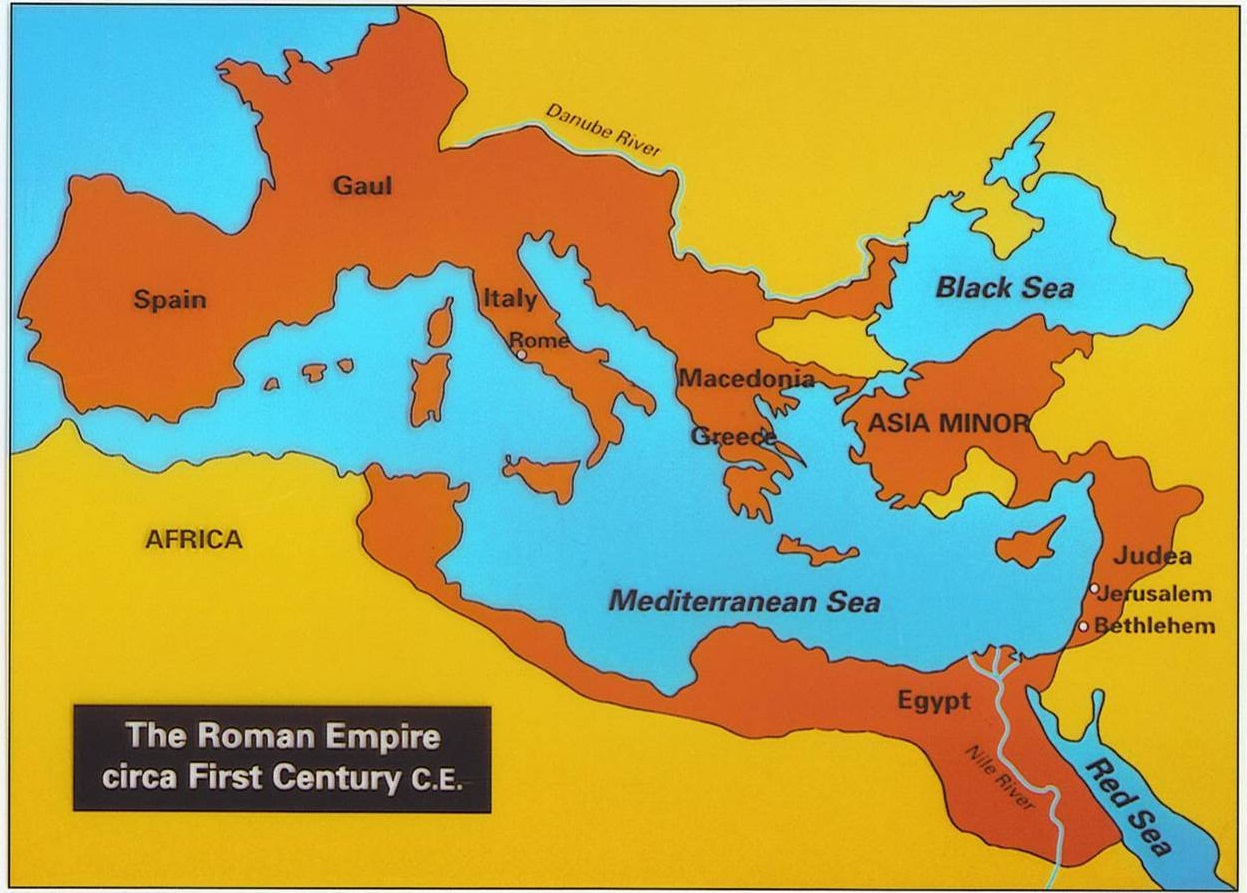
Corinth was surrounded by:
Achaea is Greece
Jerusalem
Egypt
Syria
Italy
Rome
Africa
It’s geographic location was the reason for its great success in trade, it was so accessible it made it very easy to distribute commodities throughout the Roman world.
There was Old Corinth and New Corinth
Old Corinth was established about 1000 BC and it quickly became a very influential province and reached its full potential between 200 – 300 BC. (height of power)
They say it was 5 times bigger than Athens the capital of the province.
At that time the Roman empire gave the Greek cities and states autonomy; they gave them autonomy to rule and defend themselves for a variety of reasons. One such reason was due to the piracy which happened on their open seas and the Romans being Romans didn’t want to deal with this type of problem so they gave them the power to rule and defend themselves. It wasn’t until the strength of the Achaean league that Rome came down to decimate Corinth and they did. They levelled it to the ground and killed all the men and women and children where sold into slavery and for about 100 years the city ceased to exist kind of like Jerusalem after the Romans siege it only the very poor dwelt their.
It wasn’t until Julius Ceaser saw the opportunity because of the city location which could not be ignored and as a result he re-founded Corinth.
It was this New City that Paul came too in his ministry.
The city was only about 100 years old when Paul arrived.
The population exploded because the location was some of the best real-estate in all Rome.
Facts concerning Corinth:
[SIZE=12pt]Geographically perfect location for trade[/SIZE]
[SIZE=12pt]Governed the North/South land route[/SIZE]
[SIZE=12pt]Controlled the East/West maritime route[/SIZE]
[SIZE=12pt]Can you see the main land Greece was[/SIZE][SIZE=12pt] only connected to Isthmus of Corinth to southern Greece and they controlled the trade routes between these land masses. So you can see Corinth controlled both land and sea in all directions. [/SIZE]
[SIZE=12pt]So you all can imagine how much wealth was generated through this little stretch of land connecting to seas and northern and southern Greece. Word of this would have spread far and wide and many seeking to do trade would have move here to create wealth – entrepreneurial opportunists likened to the Gold rushes of our 1800’s [/SIZE]
[SIZE=12pt]Consider the olive oil[/SIZE][SIZE=12pt], wine and the Corinthian pottery! All major exports into the world.[/SIZE]
[SIZE=12pt]Olympus to Athens you must go through Corinth! [/SIZE]
[SIZE=12pt]In Pauls days they would carry small boats across the 4 mile stretch of land where today they have made a canal[/SIZE]
[SIZE=12pt]
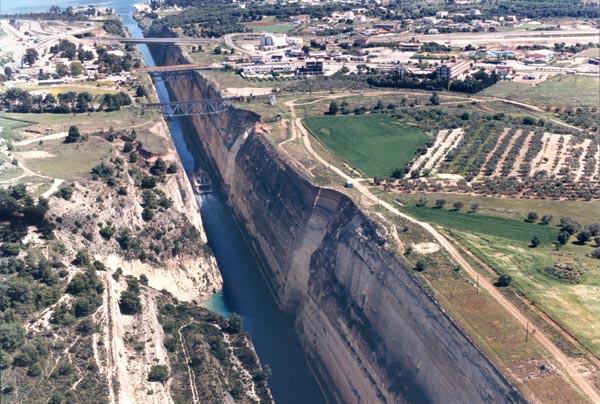 [/SIZE]
[/SIZE]
[SIZE=12pt]And by cart[/SIZE]
[SIZE=12pt]
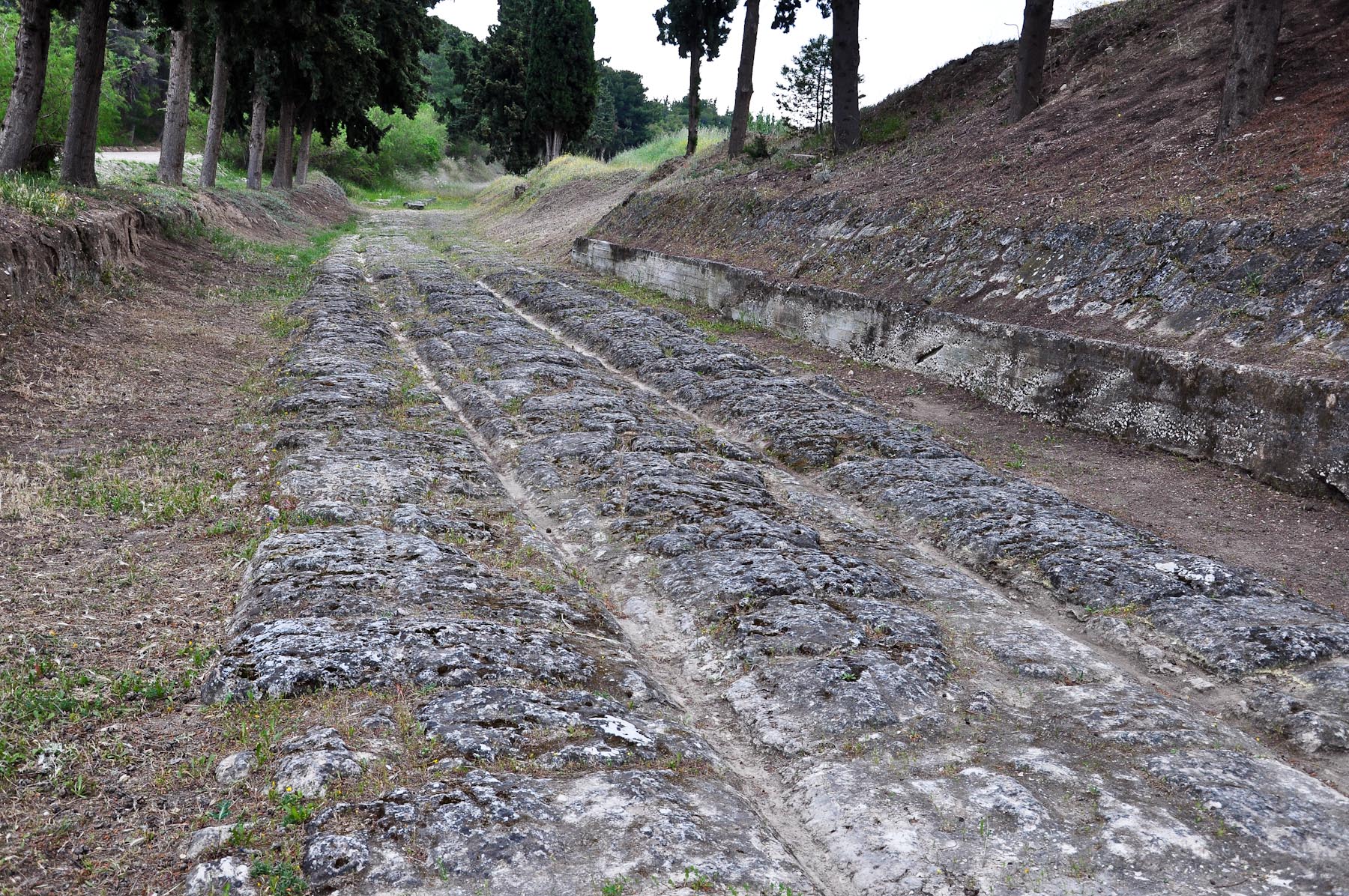 [/SIZE]
[/SIZE]
[SIZE=12pt] [/SIZE]
[SIZE=12pt]A short-cut designed to spare ships from coping with the windswept and dangerous route around Cape [/SIZE][SIZE=12pt]Maleae[/SIZE]
[SIZE=12pt]•Carried small boats[/SIZE]
[SIZE=12pt]•Off-loaded and transported cargo from large ships[/SIZE]
[SIZE=12pt]A canal allows ships to pass. [/SIZE]
[SIZE=12pt]4 miles wide[/SIZE]
[SIZE=12pt]Cape [/SIZE][SIZE=12pt]Maleae[/SIZE][SIZE=12pt] extremely dangerous due. [/SIZE]
[SIZE=12pt]And when we had sailed over the sea of Cilicia and [/SIZE][SIZE=12pt]Pamphylia[/SIZE][SIZE=12pt], we came to Myra, [/SIZE][SIZE=12pt]a city[/SIZE][SIZE=12pt] of Lycia. (Act 27:5)[/SIZE]
[SIZE=12pt]The ship advanced slowly from point to point up along the coast, the captain availing himself of temporary land breezes and of the steady westward current that runs along the coast. The sailors took advantage of every opportunity to make some distance, however small. This means that sometimes they would need to lie at anchor in the shelter of the winding coast, when the westerly wind made progress impossible.[/SIZE]
[SIZE=12pt]Sale from [/SIZE][SIZE=12pt]Ceaseare[/SIZE][SIZE=12pt] to Rome. [/SIZE]
[SIZE=12pt]Now when much time was spent, and when sailing was now dangerous, because the fast was now already past, Paul admonished [/SIZE][SIZE=12pt]them,[/SIZE]
[SIZE=12pt](Act 27:9)[/SIZE]
[SIZE=12pt]And when the south wind blew softly, supposing that they had obtained [/SIZE][SIZE=12pt]their[/SIZE][SIZE=12pt] purpose, loosing [/SIZE][SIZE=12pt]thence,[/SIZE][SIZE=12pt] they sailed close by Crete. [/SIZE]
[SIZE=12pt](Act 27:13)[/SIZE]
[SIZE=12pt]But not long after there arose against it a tempestuous wind, called [/SIZE][SIZE=12pt]Euroclydon[/SIZE][SIZE=12pt]. [/SIZE]
[SIZE=12pt](Act 27:14)[/SIZE]
[SIZE=12pt]And when the ship was caught, and could not bear up into the wind, we let [/SIZE][SIZE=12pt]her[/SIZE][SIZE=12pt] drive. [/SIZE]
[SIZE=12pt](Act 27:15)[/SIZE]
[SIZE=12pt]But when the fourteenth night was come, as we were driven up and down in [/SIZE][SIZE=12pt]Adria[/SIZE][SIZE=12pt], about midnight the shipmen deemed that they drew near to some country; [/SIZE]
[SIZE=12pt](Act 27:27)[/SIZE]
[SIZE=12pt]Slaves coming through Corinth would be forced to lift up their ships and roll them across 4 miles of land. :blink:[/SIZE]
[SIZE=12pt]
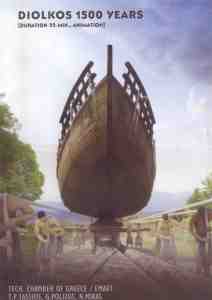 [/SIZE]
[/SIZE]
[SIZE=12pt]One [/SIZE][SIZE=12pt]of Four National Festivals Similar to the Olympic Games Traditional foot races, wrestling, boxing, javelin, discuss, etc. Also included additional events Horse races, chariot races, sailing regattas Music, singing, poetry and drama competitions. Competitors included men, women and children[/SIZE]
[SIZE=12pt]Hugely Popular held in the Spring twice as often as the Olympics 500 year history when Paul arrived Isthmian Truce provided peace during the games [/SIZE]
[SIZE=12pt]Drew multitudes of competitors and spectators[/SIZE]
[SIZE=12pt]Wars arranged a truce and guaranteed safe passage. At the games they believe people used tents to live in while the games were on – no villages have ever been found! [/SIZE]
[SIZE=12pt]They all camped out. [/SIZE]
[SIZE=12pt]Paul and Priscilla and Aquila where tents makers – which makes sense and he could preach the Gospel to people who would take up their services. It is believed they could have had a store at the Agora offering their services.[/SIZE]
[SIZE=12pt]Interesting Paul choose an occupation where he could mix with lots of people preach the Gospel![/SIZE]
[SIZE=12pt](I Corinthians 9:24-27)[/SIZE]
[SIZE=12pt]“Do you not know that in a race all the runners run, but only one gets the prize? Run in such a way as to get the prize. Everyone who competes in the games goes into strict training. They do it to get a crown that will not last; but we do it to get a crown that will last forever. Therefore I do not run like a man running aimlessly; I do not fight like a man beating the air. No, I beat my body and make it my slave so that after I have preached to [/SIZE][SIZE=12pt]others, I myself will not be disqualified for the prize.” [/SIZE]
The city of Corinth in which Paul spent at least 18 months establishing their Ecclesia is one of the most significant records we have of early Christian life. If fact we are told more about this Ecclesia and its cultural background than any other ecclesia in the Bible?
Why is that I ask? Why Corinth? And its not until we look deeply into their society and see the influence of Greek and Roman culture with all its trappings, that we begin to understand why God revealed to us such intricate detail concerning their challenges and way of life. The first letter is just short in length to the book of Romans but when you add the two letters together with the detail in the book of the Acts of the apostles, clearly it’s the largest record of any ecclesia in Asia Minor.
I believe the Corinthian culture and the circumstances surrounding this ecclesia were very unique, in fact, extremely unique, so much so, their problems were not like other Ecclesial challenges relevant to their time.
(Forum members: I hope in this study to explore both Corinth and the Ecclesia at Corinth.. I would value any contribution along the way. )
With your patience we will look briefly at Corinth, its history and then move into some of their challenges – which have become our challenges some 2000 years later.
Wealth, Entertainment & Immorality
1. Location & Business
2. Isthmian Games
3. Religion/Immorality
We will look at Corinth's commercial advantage and how this contributed to its unique culture. We will look briefly at its strong sporting history and finally consider together an immoral society where promiscuous practices were woven into the very fabric of false religious worship and how this so terribly affected the Corinthian Ecclesia and its members.
I only ask that you take this time evening to consider “your life” here in 2013, set against what which was Corinth AD50; consider your Ecclesia and the family you belong too and the pressures this society today is having on our sincere praise and worship of God and the Lord Jesus Christ. Nothing is as it seems and what is seen is not real and lasting and that which is coming cannot be seen today but is real and will be seen soon.
1 Corinthians 2:7 we speak the wisdom of God, hidden in a mystery, that God determined before the ages for our glory. 2:8 None of the rulers of this age understood it. If they had known it, they would not have crucified the Lord of glory. 2:9 But just as it is written, “Things that no eye has seen, or ear heard, or mind imagined, are the things God has prepared for those who love him.” 2:10 God has revealed these to us by the Spirit. For the Spirit searches all things, even the deep things of God.
My hope for all of you is the Word of God find a place to rest in each of you and with it you search even the deep things of God for without His Spirit Word you will find Corinth's wealth, sporting greats and a life of sexual immorality which all leads to death.
So lets go searching shall we?

Corinth was the centre of commerce and the centre of Sport in the then known world. It was known as the go to place for sexual immorality in all Rome.
You will notice in the below map how Corinth was in the centre of the then known world.

Corinth was surrounded by:
Achaea is Greece
Jerusalem
Egypt
Syria
Italy
Rome
Africa
It’s geographic location was the reason for its great success in trade, it was so accessible it made it very easy to distribute commodities throughout the Roman world.
There was Old Corinth and New Corinth
Old Corinth was established about 1000 BC and it quickly became a very influential province and reached its full potential between 200 – 300 BC. (height of power)
They say it was 5 times bigger than Athens the capital of the province.
At that time the Roman empire gave the Greek cities and states autonomy; they gave them autonomy to rule and defend themselves for a variety of reasons. One such reason was due to the piracy which happened on their open seas and the Romans being Romans didn’t want to deal with this type of problem so they gave them the power to rule and defend themselves. It wasn’t until the strength of the Achaean league that Rome came down to decimate Corinth and they did. They levelled it to the ground and killed all the men and women and children where sold into slavery and for about 100 years the city ceased to exist kind of like Jerusalem after the Romans siege it only the very poor dwelt their.
It wasn’t until Julius Ceaser saw the opportunity because of the city location which could not be ignored and as a result he re-founded Corinth.
It was this New City that Paul came too in his ministry.
The city was only about 100 years old when Paul arrived.
The population exploded because the location was some of the best real-estate in all Rome.
Facts concerning Corinth:
- The location was perfect for trade
- Governed the North/South land route
- Controlled the East/West maritime route
- Incredible wealth and prosperity
- The duty and tolls paid on trade resulted in huge revenue
- Olive oil, pottery and wine were major exports
- Profitable marketplace (Agora) offering world-wide goods
- People moved to “New Corinth” to get rich
- The “gold rush” of the ancient Roman world
- Population grew from 90,000 in 400BC to 750,000 in Paul’s day
- Mostly populated by Roman freedmen and Jews
[SIZE=12pt]Geographically perfect location for trade[/SIZE]
[SIZE=12pt]Governed the North/South land route[/SIZE]
[SIZE=12pt]Controlled the East/West maritime route[/SIZE]
[SIZE=12pt]Can you see the main land Greece was[/SIZE][SIZE=12pt] only connected to Isthmus of Corinth to southern Greece and they controlled the trade routes between these land masses. So you can see Corinth controlled both land and sea in all directions. [/SIZE]
[SIZE=12pt]So you all can imagine how much wealth was generated through this little stretch of land connecting to seas and northern and southern Greece. Word of this would have spread far and wide and many seeking to do trade would have move here to create wealth – entrepreneurial opportunists likened to the Gold rushes of our 1800’s [/SIZE]
[SIZE=12pt]Consider the olive oil[/SIZE][SIZE=12pt], wine and the Corinthian pottery! All major exports into the world.[/SIZE]
[SIZE=12pt]Olympus to Athens you must go through Corinth! [/SIZE]
[SIZE=12pt]In Pauls days they would carry small boats across the 4 mile stretch of land where today they have made a canal[/SIZE]
[SIZE=12pt]

[SIZE=12pt]And by cart[/SIZE]
[SIZE=12pt]

[SIZE=12pt] [/SIZE]
[SIZE=12pt]A short-cut designed to spare ships from coping with the windswept and dangerous route around Cape [/SIZE][SIZE=12pt]Maleae[/SIZE]
[SIZE=12pt]•Carried small boats[/SIZE]
[SIZE=12pt]•Off-loaded and transported cargo from large ships[/SIZE]
[SIZE=12pt]A canal allows ships to pass. [/SIZE]
[SIZE=12pt]4 miles wide[/SIZE]
[SIZE=12pt]Cape [/SIZE][SIZE=12pt]Maleae[/SIZE][SIZE=12pt] extremely dangerous due. [/SIZE]
[SIZE=12pt]And when we had sailed over the sea of Cilicia and [/SIZE][SIZE=12pt]Pamphylia[/SIZE][SIZE=12pt], we came to Myra, [/SIZE][SIZE=12pt]a city[/SIZE][SIZE=12pt] of Lycia. (Act 27:5)[/SIZE]
[SIZE=12pt]The ship advanced slowly from point to point up along the coast, the captain availing himself of temporary land breezes and of the steady westward current that runs along the coast. The sailors took advantage of every opportunity to make some distance, however small. This means that sometimes they would need to lie at anchor in the shelter of the winding coast, when the westerly wind made progress impossible.[/SIZE]
[SIZE=12pt]Sale from [/SIZE][SIZE=12pt]Ceaseare[/SIZE][SIZE=12pt] to Rome. [/SIZE]
[SIZE=12pt]Now when much time was spent, and when sailing was now dangerous, because the fast was now already past, Paul admonished [/SIZE][SIZE=12pt]them,[/SIZE]
[SIZE=12pt](Act 27:9)[/SIZE]
[SIZE=12pt]And when the south wind blew softly, supposing that they had obtained [/SIZE][SIZE=12pt]their[/SIZE][SIZE=12pt] purpose, loosing [/SIZE][SIZE=12pt]thence,[/SIZE][SIZE=12pt] they sailed close by Crete. [/SIZE]
[SIZE=12pt](Act 27:13)[/SIZE]
[SIZE=12pt]But not long after there arose against it a tempestuous wind, called [/SIZE][SIZE=12pt]Euroclydon[/SIZE][SIZE=12pt]. [/SIZE]
[SIZE=12pt](Act 27:14)[/SIZE]
[SIZE=12pt]And when the ship was caught, and could not bear up into the wind, we let [/SIZE][SIZE=12pt]her[/SIZE][SIZE=12pt] drive. [/SIZE]
[SIZE=12pt](Act 27:15)[/SIZE]
[SIZE=12pt]But when the fourteenth night was come, as we were driven up and down in [/SIZE][SIZE=12pt]Adria[/SIZE][SIZE=12pt], about midnight the shipmen deemed that they drew near to some country; [/SIZE]
[SIZE=12pt](Act 27:27)[/SIZE]
[SIZE=12pt]Slaves coming through Corinth would be forced to lift up their ships and roll them across 4 miles of land. :blink:[/SIZE]
[SIZE=12pt]

[SIZE=12pt]One [/SIZE][SIZE=12pt]of Four National Festivals Similar to the Olympic Games Traditional foot races, wrestling, boxing, javelin, discuss, etc. Also included additional events Horse races, chariot races, sailing regattas Music, singing, poetry and drama competitions. Competitors included men, women and children[/SIZE]
[SIZE=12pt]Hugely Popular held in the Spring twice as often as the Olympics 500 year history when Paul arrived Isthmian Truce provided peace during the games [/SIZE]
[SIZE=12pt]Drew multitudes of competitors and spectators[/SIZE]
[SIZE=12pt]Wars arranged a truce and guaranteed safe passage. At the games they believe people used tents to live in while the games were on – no villages have ever been found! [/SIZE]
[SIZE=12pt]They all camped out. [/SIZE]
[SIZE=12pt]Paul and Priscilla and Aquila where tents makers – which makes sense and he could preach the Gospel to people who would take up their services. It is believed they could have had a store at the Agora offering their services.[/SIZE]
[SIZE=12pt]Interesting Paul choose an occupation where he could mix with lots of people preach the Gospel![/SIZE]
[SIZE=12pt](I Corinthians 9:24-27)[/SIZE]
[SIZE=12pt]“Do you not know that in a race all the runners run, but only one gets the prize? Run in such a way as to get the prize. Everyone who competes in the games goes into strict training. They do it to get a crown that will not last; but we do it to get a crown that will last forever. Therefore I do not run like a man running aimlessly; I do not fight like a man beating the air. No, I beat my body and make it my slave so that after I have preached to [/SIZE][SIZE=12pt]others, I myself will not be disqualified for the prize.” [/SIZE]


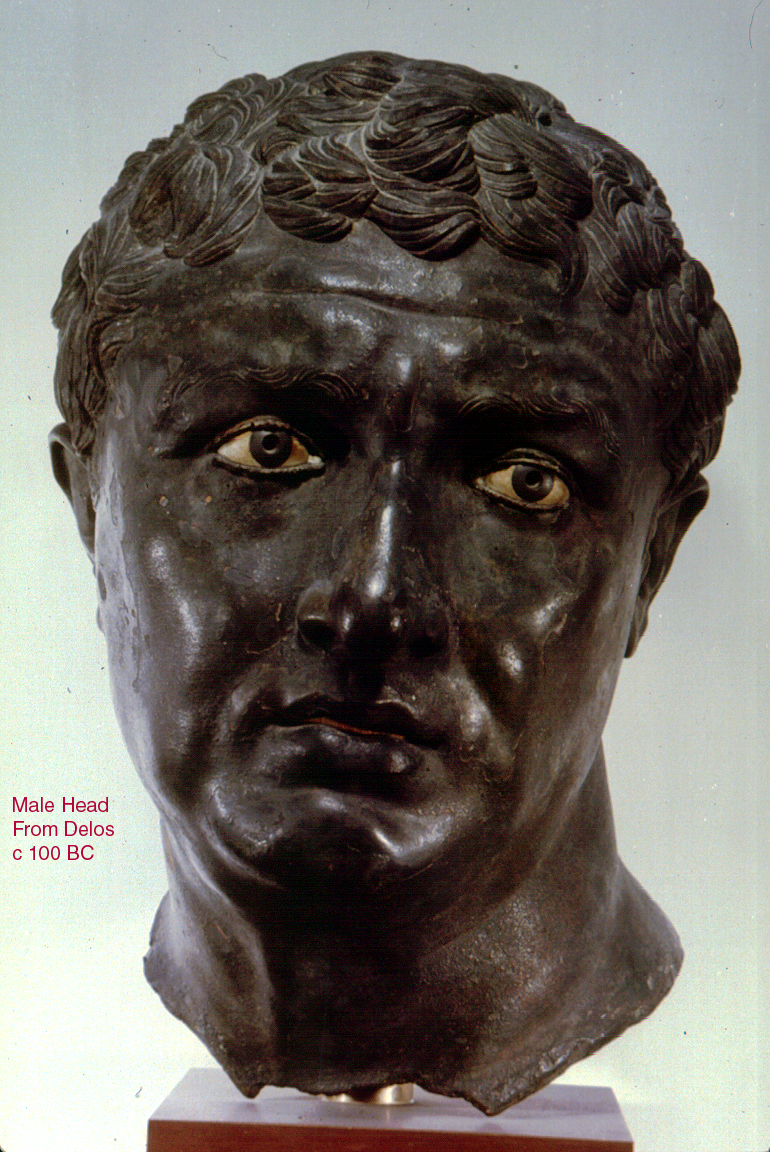
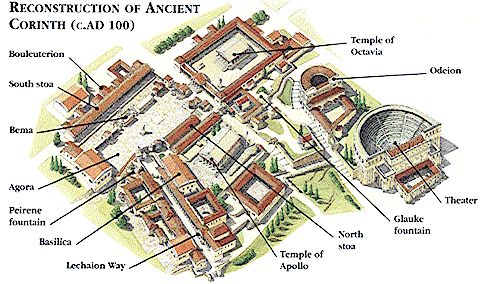
 e,
e, 